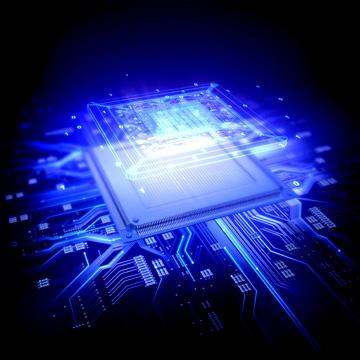Electronic systems and VLSI design
Contact: René van Leuken

In this theme, we facilitate a performance conscience methodology to realize digital and mixed electronic systems (e.g. SoC's, multi-core, dataflow DSP) starting from high level algorithm descriptions. Further, we use this methodology to realize typical complex computing blocks, for example security and safety hardware, multi-core processors, network interconnect, neuromorphic compute blocks, high-speed communication interfaces or similar complex compute blocks.
The design problem to be solved is how to design, connect and implement large IP blocks, in the 'best' possible way, i.e. in terms of speed, bandwidth, power consumption and data reliability. Topics to be covered among others low power optimization and reduction techniques, SoC design methodology, modeling, specification and implementation, communication architecture and protocols.
We work together with a large variety of partners: Medical, Telecom, Security, and technology companies. MSc projects are available in these domains.
Several languages have been developed over the years to support a designer in his design tasks. Most prominent is VHDL and more recently SystemC has emerged. Those languages provide a syntax; how to use such a language in an efficient way is an important research topic. The designer has to make choices between different architectural solutions, different partitions, etc. Typically he is concerned about speed, power, and area. How to find a solution which fulfills his requirements?
History
Automotive Intelligence for Connected Shared Mobility
Architectures for embedded intelligence and functional virtualization for connected and shared mobility using trustworthy AI
Distributed Artificial Intelligent Systems
Running existing algorithms on vastly distributed edge devices
SunRISE
Implement machine learning on encrypted data to improve security aspects of smart IoT devices
NewControl
Virtual platforms for perception and control in highly automated vehicles, based on safety by design
Computational neuroscience and bio-inspired circuits and algorithms
Low-power neuro-inspired or neuromorphic circuits and algorithms; low-power circuits and systems for neural interfacing.
Programmable Systems for Intelligence in Automobiles
(a) fail-operational sensor-fusion framework, (b) dependable embedded E/E architectures, (c) safety compliant integration of AI approaches for object recognition, scene understanding, and decision making
RESIST
Design approach for resilient integrated electronic systems in automotive and avionics applications
Heterogeneous Inception
Developing and deploying a unified design methodology and tools for system-level design and verification of heterogeneous systems
Computing Fabric for high performance Applications
Develop an open, flexible and high performance platform by substituting heterogeneous mixed HW/SW specialized sub-systems by application specific processor arrays.
MSc students
Alumni
- Xavier Morales Rivero (2025)
- Wim Kok (2024)
- Bart Hettema (2024)
- Tianyu Du (2023)
- Jiongyu Huang (2023)
- Jinyao Zhang (2022)
- Longxing Jiang (2022)
- Jinyun Long (2022)
- Yichen Yang (2022)
- Yongkang Zhou (2022)
- Jan Maarten Buis (2021)
- Bas van Otterloo (2021)
- Hanyu Ma (2021)
- Tanmay Manjunath (2021)
- Zep Kleijweg (2021)
- Preetha Vijayan (2021)
- Sybold Hijlkema (2021)
- Fang Yang (2021)
- Shreya Sanjeev Kshirasagar (2021)
- Roy Arriëns (2021)
- Randy Prozee (2021)
- Luuk de Gelder (2021)
- Martijn van Wezel (2020)